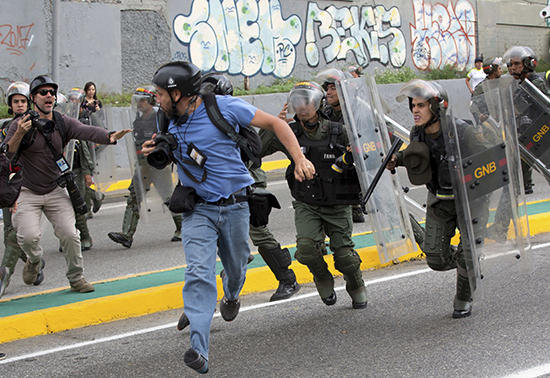New York, April 12, 2017–Venezuelan authorities should ensure that journalists can cover protests safely, the Committee to Protect Journalists said today. Several reporters have been detained, injured, or had equipment seized while covering ongoing protests over a Supreme Court ruling to strip the opposition-led National Assembly of its lawmaking powers, according to news reports and local press freedom organizations. Access to at least three independent news websites that broadcast footage of the protests is blocked in Venezuela, according to reports.
“Venezuelans cannot be fully informed on the political and economic crisis rocking the country when journalists are beaten, arbitrarily detained, blocked, and harassed by law enforcement officials,” said Carlos Lauría, CPJ’s senior program coordinator for the Americas. “We urge Venezuelan authorities to ensure that the media can report freely on protests and all matters of public interest without fear of violence.”
Elyangélica González, a correspondent for Univisión Noticias and the Colombian-based station Caracol Radio, is among the journalists attacked while covering the protests. She was surrounded by at least a dozen Bolivarian National Guard officers while reporting outside the Supreme Court for Caracol Radio on March 31, according to reports. A video of the incident published on Univision’s website shows officers hitting her, grabbing her hair, and dragging her on the ground.
Román Camacho, a reporter for the news website La Patilla, suffered a fracture in his tibia bone when Bolivarian National Guard officers threw a tear gas canister that hit his leg on April 10 in Caracas, according to a report by the website and an interview after he left the hospital. Miguel Gutiérrez, a reporter for the Spanish news agency EFE Noticias, was hit in the chest with a tear gas canister on April 6, moments after he took a photograph of a confrontation between police and an opposition senator, according to a report in La Patilla.
Bolivarian National Police detained Elvis Flores, a cameraman for the news website Venezolanos por la Información, (Venezuelans for Information or VPI TV), in Caracas on April 6 while he filmed a clash between police and protesters, according to a statement by VPI TV. He was held for at least nine hours and was beaten, according to the National Union for Press Workers in Venezuela. Separately, the Bolivarian National Guard detained Andry Rincón, a reporter for VivoPlay, in Caracas on March 31 for about a half hour and seized all his equipment apart from one memory card, according to a video report released on Twitter by his outlet. CPJ could not determine if his equipment has been returned.
Ramón Véliz, a correspondent with El Venezolano and Unión Radio, said on Twitter on April 9 that members of the Bolivarian National Guard raided his home in the northern Venezuelan state of Lara, without a warrant and pointed weapons at his family members. According to Véliz’s account of the raid on Twitter, the officers said they were looking for stolen goods and seized his cellphone when he started to record them. Véliz told CPJ he saw military police taking photos of him covering a protest the day before the raid.
Venezuelan freedom of expression organization Espacio Público documented at least 29 cases of journalists injured, harassed, attacked or prevented from covering the protest in Caracas and elsewhere between March 30 and April 8, the group’s director, Carlos Correa, told CPJ.
CPJ’s calls to the public relations department of the Bolivarian National Guard and calls to the Bolivarian National Police went unanswered.
Access to at least three news websites has also been blocked. VivoPlay, VPI TV, and Capitolio TV, which is owned by the opposition controlled National Assembly, have been inaccessible since April 7, according to reports.
Luis Carlos Díaz, a tech reporter and contributor to Global Voices, confirmed to CPJ that access to the websites is blocked inside Venezuela. He said he was unable to access the sites when he tried to view them on internet service providers within Venezuela, but when he used Tor anonymizing software or a virtual private network (VPN), which hides a user’s location online, the sites were accessible. Díaz told CPJ that he spoke with multiple contacts at privately owned telecommunications companies who told him the state operator Conatel issued an order to block the sites.
Conatel did not immediately respond to CPJ’s request for comment.
In 2014 Conatel blocked the news sites NTN24 and Infobae, both of which remain blocked. In February Conatel announced that it was suspending all broadcasts from CNN Español, arguing that the broadcaster had distorted the truth and attacked the stability of the country.
